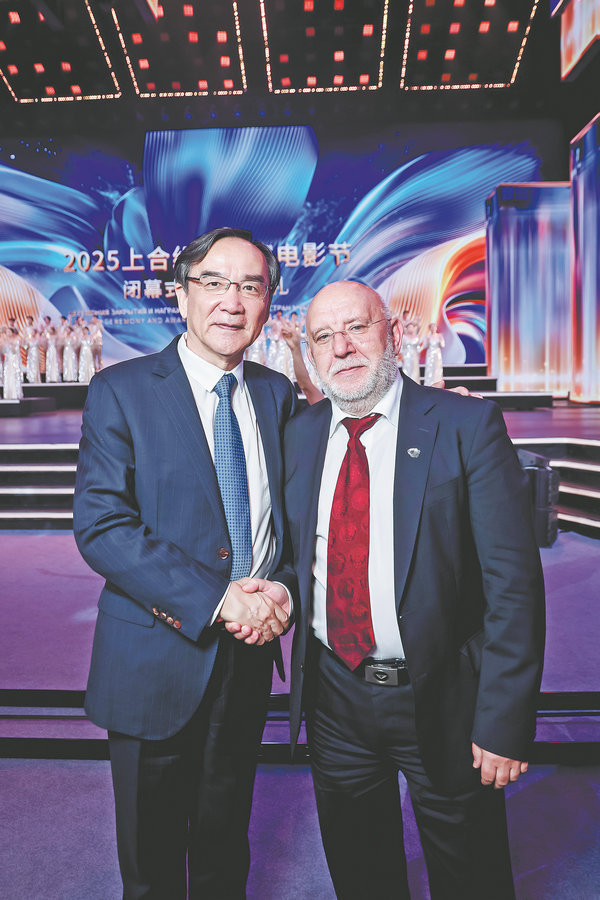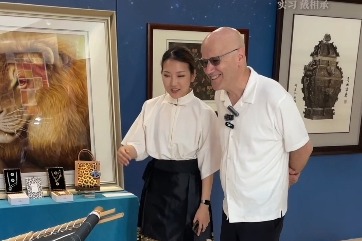Regional film festival hosts screen bonanza
China hosts SCO event for first time in seven years as industry's success story continues, Tan Yingzi and Deng Rui report in Chongqing.


To the delight of movie fans in China, they will have more opportunities in the future to watch quality films from countries such as Russia, India and Iran, as the Shanghai Cooperation Organization is promoting more partnerships and exchanges among the member countries.
At the recent SCO Film Festival held in Yongchuan district, Chongqing, from July 3 to 7, a series of initiatives and projects were launched to boost film imports, talent cultivation, and exchanges between directors and producers within the member states.
This marks the festival's return to China after a seven-year hiatus since the first edition in Qingdao, Shandong province, in 2018.
China now holds the rotating presidency of the SCO, which also includes Russia, Kazakhstan, Kyrgyzstan, Tajikistan, Uzbekistan, India, Pakistan and Iran.
As this year celebrates the 130th anniversary of world cinema and the 120th anniversary of Chinese cinema, the festival aimed to promote the SCO member states' civilizational values of equality, mutual learning, dialogue, and inclusiveness through film — regarded as a universal artistic language, according to the organizers.
The five-day event featured 11 film-themed activities, including an awards festival, screenings, a cooperation forum, a technology exhibition, an outdoor market and a concert.
The film festival organizing committee received 27 films from countries within the SCO. Selected films were screened in cinemas in downtown Chongqing.

"A 14-day training program is scheduled to take place in Beijing and Chongqing between October and November, which welcomes one to two exceptional directors and producers from each SCO member nation," said Chang Xiaoyong, head of Yongchuan district, at the 2025 SCO Film Cooperation Forum on July 4.
The 2025 SCO Film Talent Training Program will feature a diverse range of activities, including academic exchanges, hands-on experiences, industry investigations and city tours, he said.
During their stay in China, trainees' tuition, accommodation, meals, and transportation expenses will be covered by China, with the deadline for applications set for Aug 31.
On the same day, an initiative to establish the SCO Film Producers Association Alliance was jointly signed by the member countries. This initiative emphasizes film platform building and exchanges within the SCO framework, stating its aim to reshape the global film landscape prevailed by civilization exchanges and support the Shanghai Spirit to shine on the silver screen.
"This film festival provides a valuable opportunity for us to admire films crafted by our industry peers, learn about the cutting-edge high-tech techniques utilized in film studios, and draw inspiration," said Dzmitry Siamionau, general director of BelarusFilm National Film Studio. Belarus is an SCO observer country.
He noted that BelarusFilm, a century-old film studio with five indoor studios and an 80-hectare outdoor filming base, is famous for producing war films, documentaries and animated movies. He also expressed interest in inviting Chinese filmmakers to shoot at his studio.
"Despite the continued political turbulence, engaging in film discussions within the Shanghai Cooperation Organization conveys a shared aspiration for peace," he said.

He added Belarus and China enjoy an all-weather comprehensive strategic partnership, leading to multiple cooperations including cultural exchanges. At the previous Minsk International Film Festival held in the capital of Belarus, the Chinese film Chang'an, Xi'an won the Best Narrative Film award. He said he anticipates more Chinese films to participate in the upcoming 31st Minsk International Film Festival in October.
"Different countries have different expertise. China has definitely had an edge over us and all other countries in the post-production and in the technical side. Iran has an edge on the scripting side. Their teams are exceptionally good," said Samina Farzin, the director general of the Directorate of Electronic Media Publications in Pakistan, whose department is mandated to support, facilitate, and strengthen the country's film industry.
She led a Pakistani delegation of a dozen attendees, including artists, producers, directors and officials, to the film festival.
"We are working on collaboration with China, Iran, Uzbekistan, and other SCO countries, aiming to materialize and transform these partnerships into something concrete," she added.
The final day of the event showcased the prestigious Golden Camellia Awards international competition. Each SCO member and observer state nominated two selected films completed after Jan 1, 2018, to compete for 10 professional awards, including the Best Picture, Best Director, and Best Actor and Actress awards.

The Chinese film Endless Journey and Russian film Air won Best Picture. The Mongolian film The Father directed by Suvid Battulga won Best Director. Bakhyt Khajibayev, male lead of the Kazakhstani film Operation Nabat, received Best Actor, while Rano Shodiyeva, the female lead of the Uzbekistani film The Pursuit of Spring, won Best Actress.
Mongolia, an SCO observer country, is a big winner at this year's festival. In addition to The Father winning Best Director, Horizon also secured Best Cinematography. Bayarjargal Ul-Oldokh, a seasoned senior producer at Orange Entertainment, one of Mongolia's leading film companies, produced Horizon.
She noted that in 2021, Mongolia enacted a film law granting exemptions of 15 to 40 percent of film production taxes for collaborations with foreign film entities.
"With nine years of industry experience and a portfolio encompassing over 20 films tailored for the domestic market, I am now eagerly anticipating the opportunity to explore coproductions at the festival," she said.




































